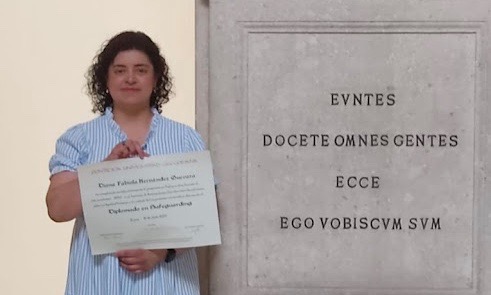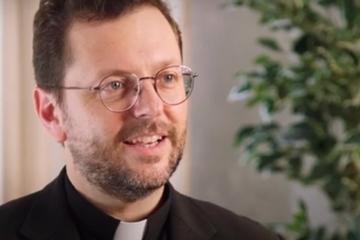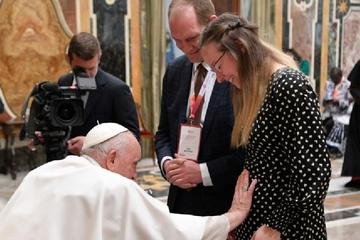
The Lay Centre was pleased to welcome three women from Mexico, who studied for the diploma in safeguarding at the Institute of Anthropology of the Pontifical Gregorian University in Rome this past semester.
In this article, Diana Fabiola Hernandez Guevara from Mexico City shares what motivated her to enroll in the program and how she intends to apply what she learned in her work with the seminary in Mexico City.
Could you tell us something about yourself: your country, your experience, studies and work?
I am a psychologist with a masterís degree in human resources administration. I worked for 10 years in human resources, selecting, hiring and training personnel.
Later, I had the opportunity to change my area of work and I started consulting in psychology and human development, teaching workshops on child development and effective parenting.
About seven years ago, I began working as a religion teacher and later at the university level. I currently teach in the faculty of psychology at the Lumen Gentium Catholic University. I also collaborate with the Conciliar Seminary of Mexico, where I carry out psychological assessments of seminary applicants and of seminarians during various phases of their formation. Likewise, I offer counseling to seminarians who require it.
Furthermore, I collaborate with CEPROME, which is an organization of professionals from various disciplines focused on promoting a safe environment in the Church for children and adolescents, as well as for vulnerable adults. I am part of the psychodiagnostic evaluation team of CEPROME and I counsel victims who have suffered sexual abuse by a member of the clergy.
What inspired you to study for the diploma in safeguarding?
At present, the sexual abuse of minors is an issue that concerns the Church and great effort is being made to prevent it and to support victims as much as possible. Abuse is terrible, but it becomes more alarming when the act is carried out by a member of the Church. This is why it is important to receive specialized training in the ecclesial sphere, in order to develop tools that will allow us to create filters in the selection and formation of those who will become clergy. We reduce risk factors by looking for committed, stable individuals, who experience social and emotional satisfaction that would enable them to live their ministry well.
How will you put to good use what you learned in Rome when you return home?
I will be able to use the resources acquired in my work at the seminary and at CEPROME, but with a broader, much more specialized vision. It will also give me the opportunity to create and teach prevention training workshops for minors.
What challenges did you face coming to Italy during the pandemic?
The first challenge was the decision to take time off, due to my stage in life, since it required me to leave part of my job, my security, stability and above all my family. It entailed a great change and a great effort, not only for me, but also for my loved ones. It tested my abilities. On the other hand, it was also a recognition of my efforts in my career. It was not an easy decision. But now I see it was a wise decision, given all the fruits I have been reaping.
Could you tell us something about your experience at the Institute of Anthropology of the Pontifical Gregorian University and The Lay Centre?
Studying at the Pontifical Gregorian University and living at The Lay Centre were both enriching experiences, due to the opportunities they offer for intercultural exchange and ways of thinking and seeing the world. They offer perspectives and alternatives that are different from oneís own reality and the possibility of finding different answers and solutions when it seems there are no other options.
The Gregorian University gave me the opportunity to form a support network, which I am sure will always be available when we return to our respective countries. I am confident that I am with professional and compassionate people, who share the same objective: to make the Church a safe place.
At The Lay Centre I found a great family that offers support and affection, which is very necessary when you are away from home, away from the people you love. They made me feel at home and I knew I could count on the members of this great family that was formed.
Why is it so important to spread information about child protection?
it is important in order to reduce the incidence of cases, since sexual abuse has an impact not only on a person's physical health, but also on their emotional health. The consequences are usually permanent if they are not attended to in a timely way and are reflected in all areas of a personís life, which is why it is important to disseminate information about it for its prevention.
Diana Fabiola HernŠndez Guevara is a psychologist and university instructor of psychology. She works as a psychotherapist at the Conciliar Seminary of Mexico and at CEPROME. She previously worked in occupational psychology for 10 years.
Photo courtesy Diana Fabiola HernŠndez Guevara


